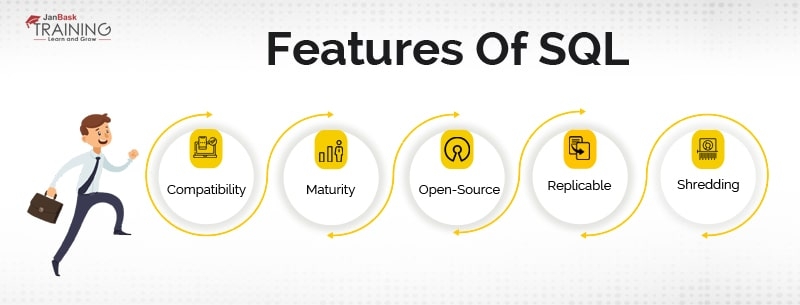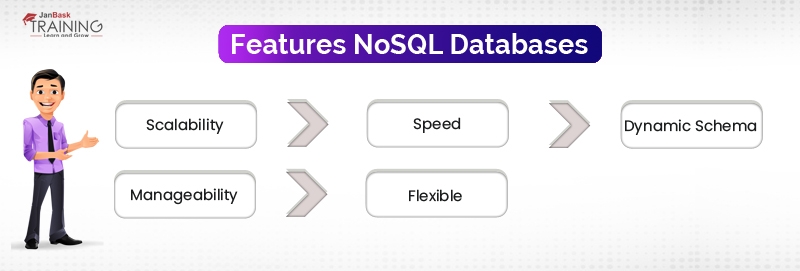17
JanNew Year Special : Get 30% OFF + $999 Study Material FREE - SCHEDULE CALL
SQL or structured query language has been in existence for more than four decades. Its usages were noticed with the rise of web applications and other databases, especially open-source MySQL, PostgreSQL, and SQLite.
On the other hand, NoSQL came into the existence since 1960 but recently they have become popular after the launch of MongoDB, Redis, Apache Cassandra and CouchDB like open-source software.
These two database handling techniques are different from each other and this article discusses their difference between SQL and NoSQL, and their characteristics. The detailed difference will help you to choose one over the other smartly. Following discussion covers these points:
Read: Windows SQL Function-All you Need to Know
SQL or structured query language is associated with relational databases and is used to process a structured database, while NoSQL databases are not relational. NoSQL databases are mostly document-oriented, non-structured and distributed, unlike SQL databases. Non-relational databases are more distributed and scattered in comparison to structured databases.
Read More: Different Between Simple, Full and Bulk Log
SQL databases are one of the widely used databases and if we talk some other most used database then it can be only MySQL and ORACLE. Recently, the NoSQL database like MongoDB is also gaining popularity. Both SAL and NoSQL are used for the same purpose, which is to store and organize the data.
Learn SQL Server in the Easiest Way

Relational databases are structured like phone books having a list of addresses and contact numbers, while in non-structured databases files are stored which may hole much information except just phone number and address.
The user has to use SQL or structured query language for manipulating and defining data and so it uses a pre-defined and similar schema for analyzing data. SQL is a great choice for complex queries. But as it is a powerful query language so it uses a predefined schema to determine the structure of data and needs up-front preparation for defining schemas. In SQL even, a minute change in the database can affect the whole system.
Incase of NoSQL, dynamic schemas is used to manage unstructured data. Here, data need not be stored in tables, it can be stored in graphs, columns, documents or any other form and it can be extracted easily from there. So, let’s discuss the difference between RDBMS and NoSQL in detail to understand the benefits of NoSQL:
SQL databases are mostly vertically scalable, it does mean that a load of a single server can only be increased just by adding more CPU, RAM or SSD. On the other hand, NoSQL databases are also horizontal scalable, which means to handle large databases more servers can be added.
Read More: Data Mining SQL Tutorial Guide for Beginner
You can take the above concepts like the addition of more floors in the same building or addition of more adjacent buildings in the above listed respective cases. As Addition of more servers makes the process more powerful, so NoSQL is considered as the ever-changing and preferred choice to manage large datasets.
Read: Most Frequently Asked RDBMS Interview Questions And Answers
SQL databases use tables while NoSQL databases use documents and use key-value pairs or graph databases or column-based databases. So, SQL uses multi-row transactions and is considered as a better option for applications, especially for any accounting or legacy system.
SQL Server Training & Certification

Examples of SQL databases are Oracle, MySQL, PostgreSQL and Microsoft Server. While for NoSQL the examples are BigTable, MongoDB, RavenDB, Redis, HBase, Neo4j, CouchDB, and Cassandra.
There were the major portions that you need to know with respect to the difference between SQL and NoSQL database
Read More: How to Increase the Speed of SQL Query Execution
Now, as we have seen that what are the key differences between structured and unstructured query languages, now let's see that what are the functional similarities and differences between both by taking the example of MySQL and MongoDB as SQL and NoSQL databases respectively:
Read: How to Compare MongoDB and DynamoDB?
Take a live training on SQL Server basics and become an expert in just a matter of six weeks
MySQL as a SQL database offers the following benefits, which are considered ad strength of this database:

Read More: How to Create Stored Procedure & Trigger
MongoDB as a NoSQL database offers the following benefits and strength to the users:

Flexible: New columns and fields can be added even without affecting the performance of the existing database and rows of the database.
| SQL Database | NoSQL Database | |
| Another Name | Also known as RDBMS or Relational Database | Is non-relational and distributed by nature |
| Basis | Use SQL to define and manipulate data, based on tables | Document-level queries are used and graphs and wide-columns can be handled |
| Data Storage | A Non-hierarchical database is used | Data is stored in hierarchical order |
| Types of Data Used | Good for those data sets stored in a structured manner | It isgood for semi-structured, nested and complex data |
| New Data | New data addition may require schema alteration | Without any alteration, new data fields can be added |
| Scalability | Are vertical scalable and with increasing hardware horsepower can be scales | Are horizontal scalable and just by increasing database servers and pool of resources the load can be distributed |
| Normalization | Often relationships are handled in a normalized manner and join are used to resolve table references | By denormalization, the data is often captured. All data for a single record is captured in an object |
| Complex Query Handling | Intensive environment to handle complex queries | Are not good to handle complex queries |
| Data Set Size | Are not good at handling large data sets | Mostly preferred for large datasets |
| Support and Adoption | It adopts widely and wide support is also available | Is not adopted widely only local community support is available |
| ACID Properties | Emphasize is on ACID property maintenance | Only a few databases follow ACID properties |
Take a free demo session of our online SQL Server Training program
SQL Server Training & Certification

We have discussed the difference between SQL and NoSQL, to learn more, you can join an online learning platform. Today NoSQL databases are becoming major choices of the organizations and can even be a real game-changer in the coming days. Properties like low cost, scalability feature that makes it quite appealing and suitable option. Though it does not offer as many features as MySQL. To choose one out of the two,developers must know which features they require and are more important for their database. Some drawbacks like the absence of ACID property support and standardization absence make it disadvantageous.
Read: SQL Operators You Need to Know
 Pinterest
Pinterest
 Email
Email
The JanBask Training Team includes certified professionals and expert writers dedicated to helping learners navigate their career journeys in QA, Cybersecurity, Salesforce, and more. Each article is carefully researched and reviewed to ensure quality and relevance.

Cyber Security

QA

Salesforce

Business Analyst

MS SQL Server

Data Science

DevOps

Hadoop

Python

Artificial Intelligence

Machine Learning

Tableau
Search Posts
Related Posts
How to Increase the Speed of SQL Query Execution
![]() 942.8k
942.8k
Difference Between Clustered and Non-Clustered Index in the SQL
![]() 208.2k
208.2k
Learn SQL Union All Query Operators with Examples
![]() 682.6k
682.6k
What Is SQL Queries? List Of All SQL Queries With Examples
![]() 793.5k
793.5k
What Does It Take To Become a Successful SQL DBA Expert?
![]() 19.4k
19.4k
Receive Latest Materials and Offers on SQL Server Course
Interviews